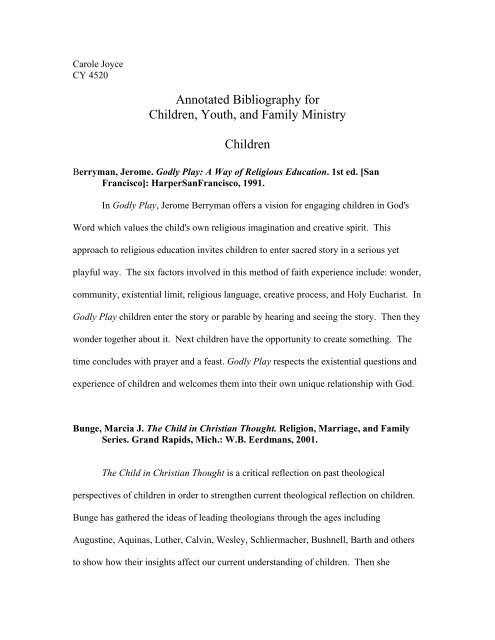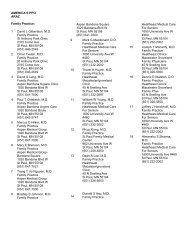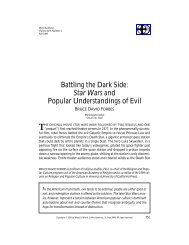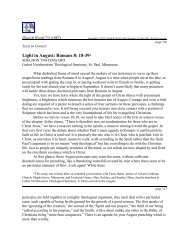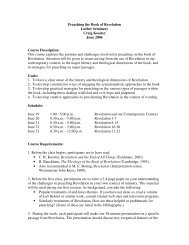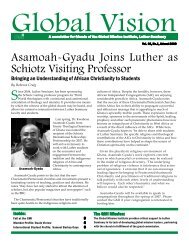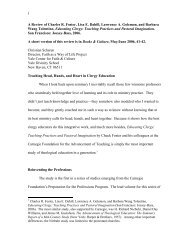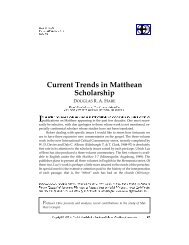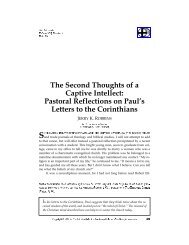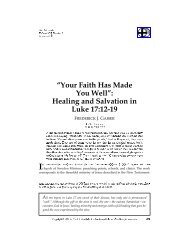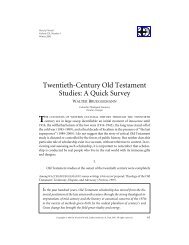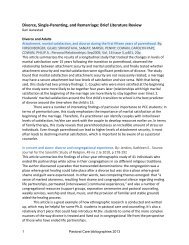Annotated Bibliography for Children's Ministry
Annotated Bibliography for Children's Ministry
Annotated Bibliography for Children's Ministry
Create successful ePaper yourself
Turn your PDF publications into a flip-book with our unique Google optimized e-Paper software.
Carole Joyce<br />
CY 4520<br />
<strong>Annotated</strong> <strong>Bibliography</strong> <strong>for</strong><br />
Children, Youth, and Family <strong>Ministry</strong><br />
Children<br />
Berryman, Jerome. Godly Play: A Way of Religious Education. 1st ed. [San<br />
Francisco]: HarperSanFrancisco, 1991.<br />
In Godly Play, Jerome Berryman offers a vision <strong>for</strong> engaging children in God's<br />
Word which values the child's own religious imagination and creative spirit. This<br />
approach to religious education invites children to enter sacred story in a serious yet<br />
playful way. The six factors involved in this method of faith experience include: wonder,<br />
community, existential limit, religious language, creative process, and Holy Eucharist. In<br />
Godly Play children enter the story or parable by hearing and seeing the story. Then they<br />
wonder together about it. Next children have the opportunity to create something. The<br />
time concludes with prayer and a feast. Godly Play respects the existential questions and<br />
experience of children and welcomes them into their own unique relationship with God.<br />
Bunge, Marcia J. The Child in Christian Thought. Religion, Marriage, and Family<br />
Series. Grand Rapids, Mich.: W.B. Eerdmans, 2001.<br />
The Child in Christian Thought is a critical reflection on past theological<br />
perspectives of children in order to strengthen current theological reflection on children.<br />
Bunge has gathered the ideas of leading theologians through the ages including<br />
Augustine, Aquinas, Luther, Calvin, Wesley, Schliermacher, Bushnell, Barth and others<br />
to show how their insights affect our current understanding of children. Then she
challenges us to consider the implications of these ideas <strong>for</strong> our contemporary views of<br />
children and our obligations to them. Reading this book draws one into the deep<br />
complexity of thought about the nature of children and challenges us in our own theology<br />
and the consequences <strong>for</strong> faith communities, culture, and the world.<br />
Coles, Robert. The Spiritual Life of Children. Boston: Houghton Mifflin, 1990.<br />
Robert Coles, a child research psychiatrist, explores children’s spirituality from<br />
the social sciences perspective in his book The Spiritual Life of Children. While many<br />
adults write about children’s spirituality, Robert Coles captures spirituality through the<br />
voices and drawings of children themselves. He brings us the words and pictures of<br />
children as they share their views on the nature of God, the devil, heaven and hell, and<br />
faith allowing children to tell their own stories.<br />
Coles discovers that children have deep perspectives on God and God’s purpose<br />
in their life. Children’s ideas are shaped by their family and faith community, but also<br />
become their own as they piece together God’s meaning in their own lives. He finds this<br />
to be true not only in the Christian, Islamic, and Jewish, traditions which he explores, but<br />
also in children without religious backgrounds. Cole’s research is particularly notable<br />
because of the extensive relationships he has built with many of the children. This book<br />
has become a classic in literature about the spiritual life of children.
Hay, David, and Rebecca Nye. The Spirit of the Child. Rev. ed. London ;<br />
Philadelphia: Jessica Kingsley Publishers, 2006.<br />
In The Spirit of the Child David Hay and Rebecca Nye share the results of a three<br />
year exploration of the nature of children’s spirituality. The authors begin with a<br />
thoughtful exploration of spirituality, its importance, and history. Then they explain the<br />
parameters of their research, defining the categories of spiritual sensitivity--attentiveness,<br />
wonder, imagination, and meaning, which they looked <strong>for</strong> in the children they<br />
interviewed. The researchers discover that children are capable of having profound and<br />
meaningful spiritual experiences from an early age and a common theme of “relational<br />
consciousness” emerged. This relationality resulted in the children feeling connected to<br />
nature, people, themselves and “Other” (God).<br />
David Hay addresses the implications of the research by making a strong<br />
argument <strong>for</strong> spiritual education in our schools. He contends that because of the strong<br />
link between people’s spiritual awareness (relationality) and ethical behavior, the present<br />
social destruction of spirituality in our culture is detrimental to the political and social<br />
environment of our communities.<br />
Heller, David. The <strong>Children's</strong> God. Chicago: University of Chicago Press, 1986.<br />
David Heller began his research with the question “How do children imagine<br />
God” The <strong>Children's</strong> God documents his research of <strong>for</strong>ty children, Catholics, Baptists,<br />
Jews, and Hindus around this question. Heller looks <strong>for</strong> similarities between the students<br />
and their understandings of God related to age, gender, personality, and family.<br />
The author finds some common themes in how these children perceive God.<br />
Children understand God as a powerful being who is capable of intimacy with people and
is present everywhere at all times. Many children showed an anxiety about God that was<br />
related to recognizing God’s holiness or “otherness”. Children see the world and all that<br />
is in it as interconnected with God being a part of those connections, actively<br />
trans<strong>for</strong>ming people and creation.<br />
One of the most interesting results of his research is a collection of children’s<br />
letters to God which give voice to the spiritual concerns and insights of children. These<br />
letters to God were published in a second book called Dear God which was published by<br />
Doubleday in 1987.<br />
Komp, Diane M. A Window to Heaven : When Children See Life in Death. Grand<br />
Rapids, Mich.: Zondervan Pub. House, 1992.<br />
In A Window to Heaven, Diane Komp tells stories of children who have cancer.<br />
This children’s cancer specialist considered herself an agnostic until she was trans<strong>for</strong>med<br />
by the witness, vibrant faith, and spirituality of children who were dying. The book<br />
chronicles the profound spiritual stories of these children and their meaningful<br />
relationships with God which can teach and challenge us all. The narratives of these<br />
terminally ill children give witness that God can work through even the unthinkable<br />
suffering of children and bring new life. Physicians, pastors, and educators would benefit<br />
from this book which affirms the spirituality of children in suffering, gives insights into<br />
healing, and offers a vision of doctor-patient relationships which respect the life narrative<br />
of the child.
Herzog, Kristin. Children and Our Global Future: Theological and Social Challenges.<br />
Cleveland, Ohio: Pilgrim Press, 2005.<br />
Children and Our Global Future takes seriously the fact that children are both<br />
vulnerable human beings in need of special care as well as influential agents in the world.<br />
Kristin Herzog powerfully portrays children as victim and savior through Biblical<br />
tradition, other faith traditions, artwork, and contemporary global issues. Staggering<br />
facts about <strong>for</strong>ced labor, slavery, prostitution, and child soldiers challenge theologians,<br />
clergy, educators, and all responsible adults to take the global welfare of children<br />
seriously. The book concludes with some reflections on how we can strengthen the<br />
world by empowering children to be God’s agents of change.<br />
May, Scottie. Children Matter: Celebrating Their Place in the Church, Family, and<br />
Community. Grand Rapids, Mich.: William B. Eerdmans Pub., 2005.<br />
The theme “children matter” is woven through this book which invites clergy,<br />
educators, and lay leaders to broaden their vision of children’s agency in the church,<br />
family, and community. The image of ministry with children as pilgrimage of faith<br />
emphasizes the mutuality of the faith journey between children and adults. Stories,<br />
theology, and practice work together to create a thoughtful and practical book about<br />
ministry with children which all congregations which children should read.<br />
Rusch, Elizabeth. Generation Fix: Young Ideas <strong>for</strong> a Better World. Hillsboro, Or.:<br />
Beyond Words Pub., 2002.<br />
Generation Fix is a book written <strong>for</strong> children and youth about children and youth<br />
who are fixing the world by feeding the hungry, working <strong>for</strong> peace, caring <strong>for</strong> the earth,<br />
and working toward equality. The inspirational stories of real kids who saw real
problems and did something about them are told by author Elizabeth Rusch. Often we<br />
think that children are not old enough to make a significant impact on the world, but this<br />
book proves otherwise. The young ideas <strong>for</strong> a better world found in this book affirm the<br />
agency of children to change the world in positive ways and inspire young and old alike<br />
to take action in their own communities.<br />
Mercer, Joyce. Welcoming Children: A Practical Theology of Childhood. St. Louis,<br />
Mo.: Chalice Press, 2005.<br />
In Welcoming Children Joyce Mercer examines biblical texts, socioeconomic<br />
studies, child-rearing practices, congregational education and worship practices, and<br />
current cultural trends in relationship to children. Her concern is to create a practical<br />
theology of childhood that will respond to the ambivalence and injustice which children<br />
face today.<br />
Mercer’s explorations of practices which marginalize children in world and in the<br />
congregation are particularly engaging. What action can we take on behalf of children in<br />
response to the consumption, marketing, and the global economy which devalue<br />
children Joyce Mercer contends that congregational practices can also marginalize<br />
children, keeping them separate in Christian education instead of welcoming children into<br />
the full life of the church. She presents a vision of learning as identity <strong>for</strong>mation,<br />
meaning making, and trans<strong>for</strong>mation through participation in the full life of the church<br />
including worship, mission, and leadership.
Miller-McLemore, Bonnie J. Let the Children Come: Reimagining Childhood from a<br />
Christian Perspective. 1st ed. Families and Faith Series. San Francisco, CA:<br />
Jossey-Bass, 2003.<br />
Using the resources of Christianity, feminism, and psychology, Miller-McLemore<br />
explores a practical theology of children as it exists in our complex postmodern society.<br />
Let the Children Come considers the themes of children as victims, children as sinful,<br />
children as gift, children as a labor of love, and children as agents. These aspects of<br />
children challenge parents and the faith community to a fuller understanding of children.<br />
The book concludes with thoughtful discussion questions and activities to engage people<br />
in deep exploration of the historical, cultural, psychological, and theological attitudes<br />
about children.<br />
Ratcliff, Donald, and Marcia McQuitty. <strong>Children's</strong> Spirituality : Christian<br />
Perspectives, Research, and Applications. Eugene, OR: Cascade Books, 2004.<br />
This comprehensive look at contemporary research in Christian perspectives on<br />
children’s spirituality was compiled from the research papers presented at the first major<br />
conference to consider the spiritual development of children. <strong>Children's</strong> Spirituality<br />
explores a wide range of topics including theologies, theories, and definitions of<br />
children’s spirituality as well as research on encouraging children’s spirituality in the<br />
home, church, school, and other contexts. I especially appreciated the historical and<br />
biblical perspectives of children’s spirituality as well as the practical methods examined.<br />
Teachers, students, and scholars interested in nurturing children’s spiritual development<br />
will appreciate this book which studies children’s search <strong>for</strong> meaning and how God<br />
works in the lives of children.
Webb-Mitchell, Brett. God Plays Piano, Too: The Spiritual Lives of Disabled<br />
Children. New York: Crossroad, 1993.<br />
In God Plays the Piano Too, Brett Webb-Mitchell tells stories of the spiritual life<br />
of children whom society has categorized “disabled”. As a Presbyterian minister, the<br />
author has worked with children with behavioral, emotional, and development disabilities<br />
throughout his life. This book chronicles the profound spiritual stories of these children<br />
who have probing spiritual questions that not only unveil their meaningful relationships<br />
with God, but can also teach and challenge us all.<br />
God ignites the profound questions, creative ability, and praise of God in all<br />
children, sometimes even more intensely in the lives of those characterized as disabled.<br />
Webb-Mitchell challenges the body of Christ, the church, to affirm the spiritual life of<br />
these children, recognize them as part of the whole people of God, and be more<br />
intentional in including them in the life of the church. Every pastor and education leader<br />
should read this book to reflect on the spiritual lives of an “invisible and ignored”<br />
segment of the population.<br />
Yust, Karen-Marie. Real Kids, Real Faith: Practices <strong>for</strong> Nurturing Children’s<br />
Spiritual Lives. 1 st ed. The Families and Faith Series. San Francisco, CA:<br />
Jossey-Bass, 2004.<br />
Real Kids, Real Faith is written by parent, educator, and pastor, Karen Marie<br />
Yust, who combines her experiences to create this theologically grounded yet practical<br />
book on children’s spirituality. This accessible book <strong>for</strong> parents covers topics including<br />
language of faith, telling stories, naming God’s presence, praying, serving, and finding a<br />
faith community. The author provides insight straight from a mother’s heart <strong>for</strong> practices
to nurture children’s spiritual and religious <strong>for</strong>mation. Her perspective of developing<br />
faith as a bicultural identity is particularly helpful in today’s secular world.<br />
This book is valuable <strong>for</strong> parents as they join their children’s spiritual journey.<br />
Engaging questions are provided <strong>for</strong> each chapter making this book a valuable resource<br />
<strong>for</strong> parent discussion groups. Leaders in children’s ministry will also benefit from the<br />
book because of the theological depth and practical ideas which are woven throughout.<br />
Yust, Karen-Marie. Nurturing Child and Adolescent Spirituality: Perspectives from<br />
the World's Religious Traditions. Lanham, Md.: Rowman & Littlefield<br />
Publishers, 2006.<br />
This comprehensive collection of essays investigates the spirituality of children<br />
and adolescents from the vantage point of the world’s major religious traditions including<br />
Buddhism, Christianity, Hinduism, Islam, and Judaism. The editor has gathered the<br />
wisdom of various religious traditions as a foundation to encourage international and<br />
interfaith dialogue around spiritual development.<br />
The themes which are studied from the different religious traditions include--the<br />
theology of children, rites of passage, practices to nurture the inner life, ethical action,<br />
who is responsible <strong>for</strong> nurturing spirituality, and social <strong>for</strong>ces which shape spirituality.<br />
Through this book, not only will scholars and students learn from the current voices on<br />
children’s spirituality, but they will also be challenged to explore new ways of cultivating<br />
the spiritual lives of children and adolescents in our complex and changing world.
Youth<br />
Bass, Dorothy C., and Don C. Richter. Way to Live: Christian Practices <strong>for</strong> Teens.<br />
Nashville, Tenn.: Upper Room Books, 2002.<br />
Way to Live is a practical book on faith practices <strong>for</strong> youth. Written by thirty six<br />
youth and adults, this book uses real life stories and situations to wrestle with the theme<br />
of what it means to live a life of faith as a teen in the complexity of today’s world. In<br />
Way to Live youth are invited into deeper relationship with God through practices which<br />
point to Jesus, connect to other Christians, and involve them in God’s activity in the<br />
world. The chapters with titles like Bodies, Stuff, Food, Creation, Work, Play, Time,<br />
Choices, and Forgiveness contain ideas from contemporary teens, the Bible, and faith<br />
giants from the past in addition to eye-catching graphics which make them easy and fun<br />
to read.<br />
The book makes a great gift <strong>for</strong> youth’s personal devotions. It is also a wonderful<br />
resource <strong>for</strong> youth Sunday school or youth group. A leader’s guide and more stories and<br />
conversations are located at this web site which is designed <strong>for</strong> both youth and youth<br />
leaders www.waytolive.org.<br />
Dean, Kenda Creasy. Practicing Passion: Youth and the Quest <strong>for</strong> a Passionate<br />
Church. Grand Rapids, Mich.: Eerdmans Pub., 2004.<br />
In Practicing Passion, Kenda Creasy Dawn explores the connections between<br />
Christ's passion and the passion of youth. Adolescents long <strong>for</strong> fidelity, transcendence<br />
and communion. As young people search <strong>for</strong> a love "worth dying <strong>for</strong>" we can explore<br />
with them "the Love who died <strong>for</strong> them", Jesus Christ. The author develops a practical<br />
theology which looks at the practices of Christian community as "curriculum of passion"
focusing on including being there, awe, and intimacy. Creasy Dawn weaves together<br />
theology, stories, history, sociology, and the practical reality of life with adolescents in<br />
this resource <strong>for</strong> those in ministry with youth.<br />
Dean, Kenda Creasy, and Ron Foster. The Godbearing Life: The Art of Soul Tending<br />
<strong>for</strong> Youth <strong>Ministry</strong>. Nashville: Upper Room Books, 1998.<br />
The Godbearing Life offers a new paradigm <strong>for</strong> ministry with youth (and all<br />
people) which focuses on tending the soul. Instead of programs and education, youth<br />
ministry is about nurturing the spiritual life of youth as well as their leaders. The authors<br />
suggest that each of us is called to be a "Godbearer" through whom God enters the world.<br />
One section of the book focuses on leaders being Godbearers rather than program leaders.<br />
Another section examines the goals of Godbearing youth ministry including--families as<br />
faith field, congregations as faith environments, adults as faith mentors, and the<br />
collaboration needed <strong>for</strong> youth ministry. The book concludes by examining practices and<br />
relationships which draw us closer to God.<br />
The Godbearing Life is rich with stories and theology to support this paradigm <strong>for</strong><br />
spiritual growth. Pastors and youth leaders will also appreciate the questions at the end<br />
of each chapter <strong>for</strong> group discussion and personal reflection. Each chapter concludes<br />
with an activity to further explore the theme.<br />
Lytch, Carol E. Choosing Church: What Makes a Difference <strong>for</strong> Teens. 1st ed.<br />
Louisville, Ky.: Westminster John Knox Press, 2004.<br />
In Choosing Church Carol Lytch shares her results from a study of three<br />
congregations which were engaging teens through the end of their high school year. She<br />
wanted to learn from the high school seniors what made a difference in religious belief in
their lives. The title of the book comes from one of the threads which the author found in<br />
her research. Today’s high school seniors live in a world with an increased sense of<br />
autonomy. Teens experience greater freedom of choices in many areas of their lives<br />
including religion. Her question is “What makes teens choose church”<br />
Carol Lytch found that teens were attracted to churches by a sense of belonging, a<br />
sense of meaning, and opportunities to develop competence. Belonging ties the youth<br />
into the fellowship of the congregation. A comprehensive sense of meaning based on<br />
religious truth was fostered through the use of symbols, narratives, sacraments, rituals,<br />
music, and worship. Opportunities to grow in competence challenged the students in<br />
various kinds of leadership. The majority of the teens interviewed said that their parents<br />
influenced their faith beliefs and practices more than anyone or anything else. What<br />
makes this book unique is that it explores these issues through the eyes of youth.<br />
Root, Andrew. Revisiting Relational Youth <strong>Ministry</strong>. Downers Grove, Ill.:<br />
InterVarsity Press, 2007.<br />
Relational ministry, building relationships with youth, has become the standard in<br />
youth ministry. Bringing youth into relationship with Christ through mentoring<br />
relationships and a youth sub-culture is the focus of most contemporary ministry with<br />
youth. In Revisiting Relational <strong>Ministry</strong>, Andrew Root challenges the popular strategy of<br />
relational ministry as influence (through personal connections and positive example<br />
influencing others toward the benefits of being in personal relationship to Jesus). Instead<br />
he proposes a theology of incarnation and place-sharing (entering deeply into other’s<br />
lives <strong>for</strong> their own sake, because that is where God is present).
Drawing from the theology of Dietrich Bonhoeffer, this theology of place-sharing<br />
takes into account the deep suffering in our world and the way that Jesus fully enters into<br />
humanity. Root also considers the interplay of person, culture and agency which leads to<br />
trans<strong>for</strong>mation in a person’s life, because Jesus’ mission is one of trans<strong>for</strong>mation, life,<br />
and healing. Disciples of Jesus who have been trans<strong>for</strong>med by God’s unconditional love<br />
are called to join in this mission of unconditional love which through God’s power can<br />
lead to trans<strong>for</strong>mation, life, and healing.<br />
Smith, Christian, and Melinda Lundquist Denton. Soul Searching: The Religious<br />
and Spiritual Lives of American Teenagers. Ox<strong>for</strong>d ; New York: Ox<strong>for</strong>d<br />
University Press, 2005.<br />
Soul Searching paints a picture of the religious and spiritual lives of American<br />
teens based on the research from the National Study of Youth and Religion. While the<br />
research shows that religion is a significant factor in the lives of many teens, what they<br />
believe and why they believe it may surprise the reader. Themes which emerge are<br />
1.Teens usually believe what they were raised to believe and most share their parent’s<br />
beliefs. 2. Religion seems to be a taken <strong>for</strong> granted aspect of life which is in the<br />
background of everyday living. 3. In keeping with American individualism, teens don’t<br />
want to judge the faith of others, suggesting that individuals should choose their own<br />
faith. 4. Teenagers treat God as something to believe in to make one feel good and<br />
resolve one’s problems. Religion is a tool to get God to do what people want.<br />
Christian Smith summarizes the religion of US teenagers as Moralistic (God is<br />
about morals and doing the right thing.) Therapeutic (God’s purpose is to solve people’s<br />
problems and to make them happy.) Deism (God created the world and will bring good
people to heaven when they die.) All those who care about teens and their faith should<br />
explore this fascinating research and consider the implications <strong>for</strong> ministry.<br />
Young Adults<br />
Anderson, David W., Paul Hill, and Roland D. Martinson. Coming of Age: Exploring<br />
the Identity and Spirituality of Younger Men. Minneapolis: Augsburg<br />
Fortress, 2006.<br />
Driven by the question "Where have all the young men gone" the authors of this<br />
book took time to listen to young men between the ages of eighteen and thirty five to see<br />
what they had to say about their lives and their faith. Seven themes emerged from their<br />
stories including relationships, nature and sports, life-defining experiences, crisis and<br />
stress, service, work, and spiritual hunger. Coming of Age reflects on these themes,<br />
theological considerations, and implications <strong>for</strong> the church and ministry. The researchers<br />
discovered a spiritual hunger in these young men which is not being addressed by the<br />
church. Coming of Age challenges pastors and church leadership to re-think the way it<br />
does ministry in our post-modern world taking into consideration the reality of gender<br />
and cultural issues. The book concludes with innovative yet practical ideas to trans<strong>for</strong>m<br />
the way the faith community engages men's spirituality.<br />
Parks, Sharon Daloz. Big Questions, Worthy Dreams : Mentoring Young Adults in<br />
Their Search <strong>for</strong> Meaning, Purpose, and Faith. 1st ed. San Francisco, Calif.:<br />
Jossey-Bass, 2000.<br />
In Big Questions, Worthy Dreams, Parks looks at the development of meaning<br />
and faith in the young adult years (age seventeen through thirty). During these years<br />
young adults recompose their meaning of self, other, world, and God; this is a time of
asking big questions and finding worthy dreams. As young adults seek to find a place <strong>for</strong><br />
themselves in the world, they seek participation, purpose, meaning, and faith.<br />
Parks argues <strong>for</strong> the importance of not only individual mentors, but more<br />
importantly of mentoring environments which recognize, support, challenge, inspire, and<br />
dialogue with young adults. Parks challenges communities of higher education, the<br />
workplace, travel, families, and religious communities to take seriously the needs of<br />
young adults and encourage them to ask the big questions which encourage critical<br />
thought about the complex issues of today's world.<br />
Adults<br />
Kegan, Robert. In over Our Heads: The Mental Demands of Modern Life.<br />
Cambridge, Mass.: Harvard University Press, 1994.<br />
Often we think of adults as having "arrived" and not developing further, but In<br />
Over Our Heads, is a trans<strong>for</strong>ming book which explores the stages adult development.<br />
Kegan considers the tasks of adult development in relationship to the complexities and<br />
demands of culture and how they shape and challenge us to learn. Kegan defines the tasks<br />
of five orders of consciousness (stages of development) and explores how they look in<br />
the situations of family life, work, and postmodern life. Through them the author lays out<br />
the trans<strong>for</strong>mation of the mind needed to cope in our contemporary society. He argues<br />
that the constantly changing demands of modern life may be developmentally<br />
inappropriate <strong>for</strong> many adults. Instead of blaming people <strong>for</strong> not being able to<br />
developmentally meet those demands, he suggests that we learn how to support people's<br />
development. Pastors and all who work with adult learning would benefit from this<br />
valuable book about adult development in the postmodern world.
Family<br />
Anderson, David Wm, and Paul Hill. Frogs without Legs Can't Hear: Nurturing<br />
Disciples in Home and Congregation. Minneapolis, MN: Augsburg Fortress,<br />
2003.<br />
In Frogs Without Legs, the authors challenge church professionals, parents, and<br />
volunteers to shift the center of faith <strong>for</strong>mation from the congregation to a shared center<br />
involving the home and ministry in daily life. The book is grounded in theological,<br />
biblical and social science, but it is accessible, entertaining, and easy to read through<br />
stories, questions, and practical examples, making it a valuable resource <strong>for</strong> helping the<br />
Christian community to pass on the faith to the next generation.<br />
Five principles of <strong>for</strong>ming faith and four key practices which promote faith<br />
development are developed with theological background, stories, and practical ideas.<br />
Parents, lay leaders, everyone who cares about the faith of children and youth will benefit<br />
from this book. This is a valuable resource <strong>for</strong> church councils and education committees<br />
who want to trans<strong>for</strong>m the ministry of passing on the faith in their congregation.<br />
Strommen, Merton P., and Dick Hardel. Passing on the Faith: A Radical New Model<br />
<strong>for</strong> Youth and Family <strong>Ministry</strong>. Winona, Minn.: St. Mary's Press/Christian<br />
Brothers Publications, 2000.<br />
In an age when many families depend solely on their congregation to nurture the<br />
faith of their children, Passing on the Faith envisions a new paradigm <strong>for</strong> youth and<br />
family ministry which involves a partnership between congregations and families. Using<br />
research from the Search institute, the authors lay out the importance of families in the<br />
faith <strong>for</strong>mation of children. Then they develop a new conceptual model of youth and<br />
family ministry which takes into consideration the influence of family, congregation,
youth subculture, community and the wider culture on passing on the faith. The book is<br />
woven with research, theology, practical ideas, stories, and diagrams to help make this<br />
vision a reality in faith communities. Written in 2000, this book has quickly became the<br />
new standard and model <strong>for</strong> excellence in youth and family ministry.<br />
Thompson, Marjorie J. Family, the Forming Center. Rev. and expanded. ed.<br />
Nashville: Upper Room Books, 1996.<br />
Faith the Forming Center is a book which focuses on the spiritual <strong>for</strong>mation of<br />
children through the family. Although God has the ultimate power to shape children’s<br />
spiritual lives, spiritual practices in the family have potential to have a constructive or<br />
destructive impact on the lives of children. Marjorie Thompson asserts that our culture<br />
encourages the separation of the sacred from the secular. Through this book she lays out<br />
a theology of God’s presence in our daily life, envisions the role of family in spiritual<br />
<strong>for</strong>mation, and suggests some spiritual disciplines <strong>for</strong> families. All of these are ways to<br />
reclaim the sacred in our daily lives.<br />
Pastors, educators, and parents alike will benefit from the vision of home as<br />
spiritual center as well as the many practical ideas <strong>for</strong> prayer, celebrating God’s presence,<br />
storytelling, serving, and worshipping. The book works well <strong>for</strong> group discussion<br />
because of the engaging reflection questions at the end of each chapter.<br />
Congregation<br />
Bass, Diana Butler. The Practicing Congregation: Imagining a New Old Church.<br />
Herndon, Va.: Alban Institute, 2004.<br />
The Practicing Congregation describes a new kind of church, one which weaves<br />
together Christian practices drawn from the long Christian tradition into an intentional
way of life in community. While many congregations in mainline denominations are<br />
declining, practicing congregations are not. They are growing theologically and<br />
spiritually resulting in an intentional practicing of faith as they engage the Christian<br />
narrative in today's world. Diana Butler Bass lays out the importance of tradition, faith<br />
practices, intentionality, and theological imagination to the mission of a congregation.<br />
She describes the intentional congregations which she studies as characterized by<br />
mobility, risk, reflexivity, and reflection. Discussion and reflection questions <strong>for</strong> each<br />
chapter make this a valuable resource <strong>for</strong> lay leaders and church councils as well as<br />
pastors.<br />
Bass, Dorothy C. Practicing Our Faith: A Way of Life <strong>for</strong> a Searching People. 1st ed.<br />
San Francisco, Calif.: Jossey-Bass, 1997.<br />
Christian practices are ordinary things Christians do together, shaped in response<br />
to God's presence in the world. In Practicing Our Faith, Dorothy Bass uses scripture,<br />
story, tradition, and examples to think deeply about the following faith practices: body,<br />
hospitality, economics, Sabbath, testimony, discernment, communities, <strong>for</strong>giveness,<br />
healing, dying, and singing. This book addresses the search <strong>for</strong> a life-giving way of life<br />
by holding up "practicing our faith" as a way to deeper relationship with God.<br />
Dykstra, Craig R. Growing in the Life of Faith: Education and Christian Practices.<br />
2nd ed. Louisville, Ky.: Westminster John Knox Press, 2005.<br />
In Growing in the Life of Faith, Craig Dykstra explores how faith is shaped<br />
through education, worship, and faith practices. As an educator, he knows that thinking<br />
and doing, believing and living are connected. This book considers how the practices of
Christian life shape faith and are shaped by faith in the diverse contexts of life, home,<br />
congregation, higher education, and theological education.<br />
Pastors and Christian educators will benefit from this study of faith practices in<br />
relation to education. The study guide at the end makes this book appropriate <strong>for</strong> groups<br />
study as well.<br />
Everist, Norma Cook. The Church as Learning Community: A Comprehensive Guide<br />
to Christian Education. Nashville, TN: Abingdon Press, 2002.<br />
With a vision of congregation as learning community, Norma Cook Everist has<br />
combined theory and practice as well as biblical and theological perspectives in this<br />
comprehensive book about Christian education. Written to help faith communities create<br />
learning environments that allow us to be different in a pluralistic world, the book offers<br />
practical ideas, strategies, tools, and reflection questions. She explores themes of<br />
diversity in learning styles, lifelong learning, confirming practices, equipping leaders,<br />
mission, and vocation. While this book is a wonderful research <strong>for</strong> Christian education<br />
leaders, it could be particularly trans<strong>for</strong>ming <strong>for</strong> pastors who haven't thought much about<br />
the central role of education in the life of a congregation.<br />
Stortz, Martha Ellen. A World According to God: Practices <strong>for</strong> Putting Faith at the<br />
Center of Your Life. 1st ed. San Francisco: Jossey-Bass, 2004.<br />
Martha Stortz captures the readers’ religious imagination about the kingdom of<br />
God with the metaphor of A World According to God. Through real life stories and<br />
examples as well as Biblical narrative, practices of faith come alive as ways to live in<br />
relationship with God. Although the author dives deep into Christian faith as discipleship<br />
with themes like Baptism, Lord’s Supper, prayer, <strong>for</strong>giveness, resurrection, and fidelity,
her engaging style is accessible <strong>for</strong> ordinary people, new Christians, and young adults as<br />
well as anyone yearning <strong>for</strong> deeper relationship to God.<br />
Leadership<br />
Bass, Diana Butler. Christianity <strong>for</strong> the Rest of Us: How the Neighborhood Church Is<br />
Trans<strong>for</strong>ming the Faith. 1st ed. San Francisco: HarperSanFrancisco, 2006.<br />
In an age when most mainline Protestant congregations are declining, Diana<br />
Butler Bass finds that some mainline congregations are experiencing vital, authentic,<br />
spiritual growth. In Christianity <strong>for</strong> the Rest of Us, Butler Bass explores the changing<br />
context of the world today and shares her research in these congregations which are<br />
thriving in the postmodern context. This book offers a hopeful vision <strong>for</strong> faith<br />
communities which through prayer and imagination are willing to be trans<strong>for</strong>med by the<br />
Holy Spirit to serve the world.<br />
The ten signs of renewal which emerged in these trans<strong>for</strong>ming congregations are<br />
hospitality, discernment, healing, contemplation, testimony, diversity, justice, worship,<br />
reflection, and beauty. The author reflects on each of the themes and shares stories of<br />
authentic, meaningful ministry around each theme. Butler Bass challenges congregations<br />
to <strong>for</strong>m deep roots in tradition while simultaneously engaging the world. Trans<strong>for</strong>ming<br />
congregations ask these two questions: Who are we What is God calling us to do<br />
Reflection questions <strong>for</strong> each chapter make this book a valuable resource <strong>for</strong> small<br />
groups as well as congregational leadership—both lay and clergy.
Cladis, George. Leading the Team-Based Church: How Pastors and Church Staffs<br />
Can Grow Together into a Powerful Fellowship of Leaders. 1st ed. San<br />
Francisco: Jossey-Bass, 1999.<br />
George Cladis in Leading the Team-Based Church proposes that leadership in the<br />
church follow the model of cooperation, participation, and relationship found in the<br />
Father, Son, and Holy Spirit in their Trinitarian connections. Using art, contemporary<br />
images, church history, and scripture Cladis begins with the theological foundation <strong>for</strong><br />
ministry as a dance with each other and God. Then Cladis shows how the post modern<br />
culture supports this leadership model as well.<br />
The second part of the book expands on seven key attributes of ministry teams<br />
that reflect the image and community of God--convenanting, visionary, culture-creating,<br />
collaborative, trusting, empowering, and learning. Each theme is explored biblically,<br />
through contemporary culture, leadership techniques, and practical "how to" ideas to<br />
engage these attributes.<br />
The power in this understandable book lies in the depth of the biblical and<br />
theological grounding which is held in relationship to contemporary context and then<br />
shaped into practical tools <strong>for</strong> leadership and ministry. This collaborative model of<br />
leadership brings together faith and culture to serve God's kingdom. Clergy and lay<br />
leadership teams would benefit from reading this book and putting it into practice.<br />
Gunderson, Gary. Boundary Leaders: Leadership Skills <strong>for</strong> People of Faith.<br />
Minneapolis: Fortress Press, 2004.<br />
In a world full of fear and despair, Gary Gunderson has written Boundary Leaders<br />
to challenge people of faith to stop waiting <strong>for</strong> institutions and systems to act faithfully.<br />
Instead he calls us to move with purpose and hope into the ambiguities of modern life, to
seek rebirth and wholeness amidst the brokenness. Gunderson explores the themes of<br />
boundary zones, boundary leaders, and webs of trans<strong>for</strong>mation sharing research,<br />
techniques, stories, and profiles to enliven the imagination of leaders. Because change<br />
occurs at the intersection of boundary zones (like religious and secular), the author<br />
proposes that "boundary leaders" cross zones or boundaries aligning assets of one group<br />
with needs of another. Boundary leaders create ways to build a web of relationships<br />
which can make hope and healing possible.<br />
Kegan, Robert, and Lisa Laskow Lahey. How the Way We Talk Can Change the Way<br />
We Work: Seven Languages <strong>for</strong> Trans<strong>for</strong>mation. 1st ed. San Francisco:<br />
Jossey-Bass, 2001.<br />
How the Way We Talk Can Change the Way We Work brings together adult<br />
learning and personal and institutional change. While adults may want to change aspects<br />
of themselves, there are powerful inclinations not to change. The authors explore the<br />
resistance to change and offer language to trans<strong>for</strong>m the way we think and act. The four<br />
internal changes include moving from complaint to commitment, from blame to<br />
responsibility, from resolutions to competing commitments, and from assumptions<br />
holding us to holding our own assumptions. Three social changes affect interpersonal<br />
relationships including the change from praise to ongoing regard, from rules to public<br />
agreement, and from constructive criticism to deconstructive criticism. Stories and<br />
personal exercises are combined with developmental psychology to make this book a<br />
valuable tool <strong>for</strong> those in leadership.


